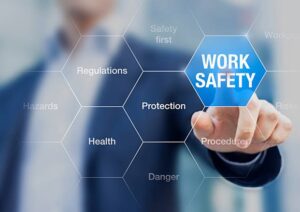Hazards exist in every workplace, whether outdoors, in an office, or amidst heavy machinery. Taking proactive measures to identify and control these risks is essential for preventing workplace injuries.
This blog explores effective ways to create a secure work environment and the essential training programmes that help promote workplace safety
The Importance of Workplace Safety
Workplace safety refers to an organisation’s collective efforts to safeguard employees from potential harm. It encompasses a range of measures designed to eliminate or control workplace risks to prevent accidents, injuries and health issues.
Ensuring workplace safety is a legal requirement and contributes to overall organisational success. A safe work environment fosters employee morale and reduces absenteeism to raise productivity. It also enhances the company’s reputation and promotes trust among stakeholders.
10 Ways to Promote Workplace Safety
Here are ten effective ways to prioritise safety in the workplace:
1. Promote a Safety Mindset:
Positive reinforcement enhances commitment to safety. Foster a safety-oriented culture by recognising and rewarding employees who actively contribute to a secure work environment.
2. Continuous Improvement:
Regularly review and update safety policies based on changing work conditions, industry standards and incident analysis. A dynamic approach ensures safety measures evolve to meet current challenges.
3. Comprehensive Risk Assessments:
Conduct thorough risk assessments to identify potential hazards and determine sufficient controls. Regular evaluations ensure safety measures remain current and effective.
4. Effective Communication:
Establish clear communication channels for reporting safety concerns and incidents. A transparent system encourages employees to raise issues, contributing to a proactive safety culture.
5. Safety Signage and Labels:
Enhance awareness and compliance through visual cues. Ensure the workplace is appropriately marked with safety signs and labels to guide employees on potential hazards and necessary precautions.
6. Personal Protective Equipment (PPE):
Make PPE compulsory and provide employees with the necessary gear, including helmets, gloves, goggles and other protective clothing relevant to the work environment.
7. Regular Equipment Maintenance:
Regularly inspect and maintain all machinery and equipment to prevent malfunctions and reduce the risk of accidents. Timely maintenance is crucial for ensuring the longevity and safety of equipment.
8. Emergency Response Plans:
Develop and communicate comprehensive emergency response plans. Conduct regular drills to familiarise employees with evacuation procedures, first aid protocols and other emergency measures. Rehearsal minimises the risk of panic or mistakes should a real emergency happen.
9. Promote Ergonomic Practices:
Address ergonomic concerns to prevent musculoskeletal disorders and other related health issues. Provide ergonomic furniture and educate employees on proper posture and workspace setup.
10. Employee Training Programmes:
Well-informed employees are better equipped to prevent accidents. Implement robust training programmes to educate employees about safety protocols, emergency procedures and the proper use of equipment.
Workplace Safety Training Programmes
Safety training is crucial to reduce workplace accidents and promote employees’ well-being. Important workplace safety training programmes include:
● Health and Safety Courses
Health and safety courses help mitigate the risk of accidents, prevent injuries and enhance productivity. They provide a comprehensive education on workplace safety practices, covering risk assessment, emergency procedures and regulatory compliance.
● PPE Training
PPE training educates employees on the proper selection, use and maintenance of protective gear like helmets, gloves and goggles. It helps employees understand how to safeguard themselves against specific workplace hazards using PPE effectively.
● First Aid at Work Course
First aid at work course equips employees with essential first aid skills to respond to workplace injuries or medical emergencies. It teaches life-saving techniques, including first aid and cpr courses to stabilise patients until professional medical help arrives.
● Fire Safety Training
Fire safety training educates employees on the proper response to fires, including evacuation procedures, safe use of firefighting equipment and strategies for workplace fire prevention.
● Manual Handling Training
Manual handling training focuses on safe lifting, carrying and movement techniques to prevent musculoskeletal injuries. Employees learn proper body mechanics, lifting principles, and how to use equipment to reduce the risk of strains and injuries.
● Display Screen Equipment (DSE) Training
DSE training addresses the health and ergonomic aspects of using computer workstations. Employees learn about setting up their workstations ergonomically, taking breaks and adopting practices that reduce the risk of discomfort and musculoskeletal issues associated with prolonged computer use.
Conclusion
Prioritising workplace safety is not just a legal requirement; it is an investment in the success and sustainability of any organisation. By implementing the ten strategies outlined in this guide and supporting them with robust training programmes, employers can create a culture of safety that benefits both employees and the overall workplace.









